How the "squad of heroes" of Bagration saved the Russian army
Napoleon, angry with Mortier’s defeat (the French emperor was at this time in St. Peltin and heard the sounds of a battle at Krems, but could not help his marshal), decided to smooth the rumor about the failure of the French army. He decided to achieve a resounding success by taking Vienna and simultaneously attacking Kutuzov. Napoleon ordered Murat with the Lanna, Soult corps and the Udino grenadier division to rush to Vienna and to capture the bridge over the Danube, which was defended by Austrian troops led by Prince Auersperg, then go to the rear of the Russian army, forcedly marching off to the rear of the Russian army, cutting off Kutuzov from reinforcements coming from Russia.
Napoleon hoped that Kutuzov, protected by the Danube, would not rush to leave Krems. At this time, the French corps of Bernadotte and Mortier stood at Mautern, opposite Krems. They were instructed to prepare materials for the bridge and, at the first news of Kutuzov’s departure, begin crossing the river flotilla and push the Russian army from the rear.
Indeed, Kutuzov originally planned to spend some time in Krems. Russian troops quietly rested for the first time in two weeks of marches and battles, without worrying about the attack of the enemy. Kutuzov was approached by part of his army, which was delayed in Russia because of the threat of war with Turkey. Kutuzov planned to observe the actions of the enemy. The French could only cross the bridge at Vienna, but the Austrians stood here and they received the emperor's order to defend the crossing to the last, not allowing the enemy to cross and destroy it when they left.
The French entered Vienna 1 (November 13) 1805 g. In the Austrian capital have not seen the enemy. In the Austrian capital, the French seized a large number weapons, ammunition, all kinds of equipment and supplies. The Viennese garrison withdrew to the ferry without a fight and prepared for defense.
However, the French tricked the enemy. Here's how the historian E. V. Tarle described the daring outburst of the French: “Murat, Lannes, Bertrand and one sapper colonel (Dod), skillfully hiding the grenadier battalion in the bushes and thickets, themselves without cover appeared to the bridgehead fortification, declared confused to the Austrians, who were led It was at the first appearance of the enemy to blow up the bridge, that a truce had already been concluded, passed the bridge, called General Prince Auersperg, repeated their lies about the truce, and by this signal, before the Auersperg managed to answer, the French grenadiers suddenly jumped out of the cous comrade and rushed to the Austrians and the guns, placed on the bridge. In one minute the French battalion occupied the bridge; the Austrians tried to resist, but it was quickly broken. ”
Now, without losing an hour of time, Napoleon, to whom exultant Murat reported on this amazing incident, ordered to cross the bridge and go straight to the Russian army, cutting off its retreat path. A difficult time has come for the Russian army. Napoleon, with his main forces, passed from Vienna over the Danube and sought to block the Russians from their hasty retreat to the north. In the meantime, Mortier and Bernadot were to attack Kutuzov from the rear. A cavalry division was sent behind the retreating Austrians of Auersperg, which captured many carts transported by the Austrians from Vienna.
Napoleon takes the keys to Vienna. Anne Louis Girodet de Russ-Triozon
The departure of the Russian army. Murat's error
Kutuzov, who established a good intelligence network, learned of the fall of Vienna and the capture of the French crossing on the evening of November 1. He realized that the French would try to intercept the road to Znaim (Znojmo) and Brunn (Brno). Therefore, it was impossible to remain in Krems, it was necessary to hurry on the road from Vienna to Brünn, where Buxgevden went. The Russian commander immediately ordered the withdrawal, forwarding gravity. Miloradovich led the rearguard. On the night of 1 on November 2 (November 13-14), the Russian army launched from Krems.
Marching all night, on November 2, Russian troops arrived at Ebersbrunn. Here Kutuzov received a notice from the Austrian emperor that the French forced the Danube. In order to disrupt the enemy’s plans and delay him, Kutuzov decided to take a road from Vienna to Znaim and sent Bagration's detachment to Hollabrunn. Bagration had to hold on until the army moved onto the Znaim road. The detachment of Bagration without rest made a new march and in the morning of November 3 (15) was at Hollabrunn. There was only about 20 west from Ebersbrunn to Hollabrunn, but the march was heavy, as the soldiers marched at night through rough terrain, along paths through ravines and vineyards.
Having sent a detachment of Bagration, Kutuzov also spoke. On the night from 2 to 3 November, a heavy rain poured, so the troops went knee-deep in mud. During the night march, Kutuzov received good news from Miloradovich. Threats from the rear has not yet been. Corps Bernadot and Mortier were detained by rain and storm, and could not quickly cross the Danube. Behind the rear guard Miloradovich moved only equestrian patrols of the enemy.
Meanwhile, Bagration studied the area from Hollabrunn and found it unprofitable for defense. He led the troops two versts beyond Schöngraben and beyond the stream. At the disposal of Russian generals were Kiev Grenadier, Podolsky and Azov musketeer, 6-th Jaeger Regiment, one battalion of the Novgorod and Narva musketeer regiment, Pavlograd and Hesse Hamburg-hussar, Chernigov dragoons and two Cossack Regiment, Artillery Company. Total 7300 people with 12 guns.
Prince Bagration put in the first line Kiev Grenadier, Podolsky and Azov regiments. The Chernigov Dragoon regiment was located on the right flank, and the Pavlograd hussarsky regiment was on the left flank. In reserve were battalions of the Narva and Novgorod regiments. The 6 th jäger regiment occupied Schöngraben. Artillery was located in front of the center. Located in the rear of the village of Grund was prepared for the defense. Count Nostitz with two Cossack regiments and the Hesse-Hamburg hussars was in the vanguard in Hollabrunn.
While the Russians were preparing for defense, Bagration received news that Count Nostitz, after negotiations with the French, was retreating from Hollabrunn. Murat, having discovered the Austrian hussars in front of him, informed Count Nostitz that peace had been concluded between Austria and France, and his proof was the free passage of the French army across the Danube in Vienna. Count Nostitz believed Murat and refused to support Bagration. In vain, the Russian commander assured Nostitz that this was a lie, that the assurances of the French were a military trick. Count Nostitz retreated with his hussars. So, Bagration has lost part of his squad. He reinforced the flanks of the Cossacks, sent patrols to neighboring roads and ordered the troops to prepare for battle.
The French had almost a triple superiority: more than 20 thousand bayonets and sabers. The Grenadiers of Oudinot attacked downtown through the village of Schöngraben. The infantry of Legrand was advancing from the left flank, the Syushe division from the right flank, and also Legrand was supported by Walter's cavalry. The Nansuti cavalry was in reserve. On the road to Schöngraben, Vandam’s forces also attacked.
Using the departure of the Austrian hussars, Murat went to Schöngraben. Bagration ordered the rangers to leave the village and join the right flank. At this time, the army of Kutuzov passed behind the barrier of Bagration. The French entered the village and put artillery in the center. Murat, having discovered Bagration before him and knowing that Kutuzov was a few miles away, did not dare to attack on the move, having considered that the whole enemy army was standing in front of him. The infantry has not yet come all the way and was in a half-mascot. He again decided to resort to tricks to detain Kutuzov, until the lagging troops arrived and Bernadotte and Mortier corps would come to the rear of the Russian army. As soon as a firefight began in the forward posts, Murat sent a negotiator to Prince Bagration, with a proposal for an armistice, with the condition that the armies remain in their places. Like, after the peace of Austria with France, the war is meaningless. He wanted to deceive Bagration, as he had twice outwitted the Austrians.
However, Murat miscalculated. "The smartest of the cunning" Kutuzov himself outwitted the enemy. He sent Adjutant-General Wintzingerode to Murat in order to enter into negotiations and conclude a truce. Kutuzov wanted to gain time and have time to lead the army. Wintzingerode signed a truce. The Russian army was returning to Russia, on the same road along which it came. The French were not supposed to go further to Moravia. Conditions were submitted to Kutuzov and Napoleon for ratification. At this time, the troops remained on the ground. So in the negotiations passed 3 (15) November.
The truce was sent to Kutuzov and to Vienna, to Napoleon. Murat triumphed. He thought that he had accomplished a great deed, forcing the Russian army to stop, and then take over the world and go to Russia. However, instead of gratitude I received a severe reprimand. Napoleon was a smart man and immediately saw through the opponent’s move. The French emperor did not approve the truce and ordered the immediate attack on the Russian army.
Napoleon wrote to Murat: “I cannot find words to express my displeasure to you. You only command my avant-garde and have no right to make a truce without my orders. You make me lose the fruits of the whole campaign. Immediately break the truce and go against the enemy. You will announce to him that the general who signed this surrender did not have the right to do so, and no one has it, except for the Russian emperor. However, if the Russian emperor agrees to the said condition, I will also agree; but this is nothing but a trick. Go destroy the Russian army. You can take her carts and her artillery. The adjutant general of the Russian emperor is a deceiver ... The officers mean nothing when they have no authority; he also does not have it ... The Austrians let themselves be deceived when crossing the Viennese bridge, and you let yourself be deceived by the emperor's adjutants. ”
Fearing new mistakes from his commanders, Napoleon left Vienna with the guard and the division of Cafarelli. The French emperor also cursed Bernadotte, who was in no hurry to cross the Danube. When leaving Vienna for Hollabrunn, having learned that Bernadot had not yet crossed the Danube, Napoleon ordered Marshal Bertier to write to him: “The emperor is angry with you. Prince Murat, the marshals of Lana and Soult fight the Russians in two crossings from Vienna, and you have not yet crossed the Danube. ... The Emperor hopes to receive from you with the same officer sent to you by the report that you are pursuing Kutuzov, pinning Russian bayonets. "
Meanwhile, Kutuzov, and did not think to fulfill the terms of the truce, delayed the answer and during that time managed to withdraw the army for two marches. Bagration's detachment remained a barrier, saving the whole army. Kutuzov himself believed that the detachment of Bagration was doomed, left "to inevitable death for the salvation of the army."
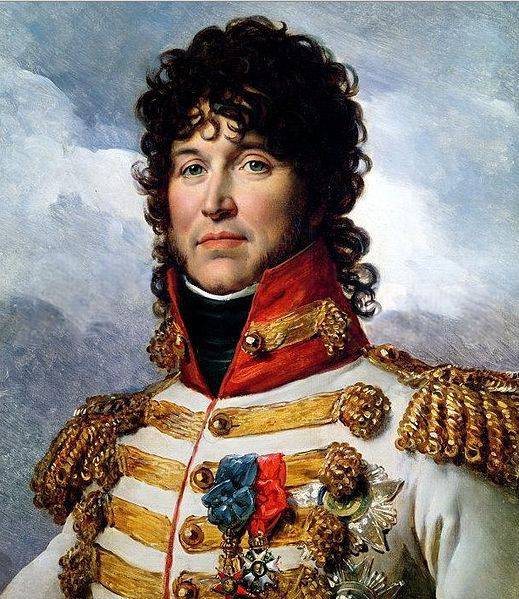
Marshal Joachim Murat
Battle of Hollabrunn (Schöngrabene)
4 (16) November 1805. At 5 hours of the day Murat received a reprimand and Napoleon's order to attack the Russians. The battle began. Grenadiers Oudinot and reserve cavalry were advancing in the center. Soult had to bypass the right wing of Bagration, Lannes - the left wing. The French hoped to recover the time spent on negotiations with a quick move. However, our gunners, responding to the French shelling, lit up Schöngraben. A strong fire began, the wind was in the direction of the French. The fire threatened to ignite the charging boxes, they had to be taken out.
This fire slowed the movement of the center of the French army. However, the French flanks quickly advanced and attacked our retreating troops. The flanks of Bagration were forced to retreat in order not to be surrounded by the superior forces of the enemy. The right wing of Bagration was attacked by horse grenadiers. The French were met by the Kiev Grenadier, the 6 of the Chasseurs and Chernigov Dragoon regiments under the command of Ulanius. The grenadiers and huntsmen met the enemy with battalion volleys and repulsed two attacks. Chernigov dragoons and Cossacks counterattacked the French. Then Ulanius, under the cover of artillery fire, riflemen and Cossacks, began to withdraw troops. The French cavalry again overtook the Ulanius column, but did not dare to attack.
On the left flank the situation was harder. Here Lunn was able to concentrate large masses of troops. After several attacks, the French were able to cut off the Pavlograd hussars from the rest of the troops. He was forced to retreat on his own and go on another road in order to connect with his own. Then Lannes surrounded the Podolsky and Azov regiments. Twice Russian soldiers fought their way with bayonet attacks.
In the center, Murat and Oudinot, detained by a fire in Schöngrabene, rushed in pursuit of Bagration, continuing to conduct artillery fire. The French were pushing from all sides. The enemy cavalry used every opportunity to attack our troops. Our soldiers fought back with bayonets and, keeping order, continued to move. Prince Bagration quietly moved from one regiment to another and encouraged people with his presence. It was not necessary to say anything, everything was clear. Death raged around the hero, but fate took care of him.
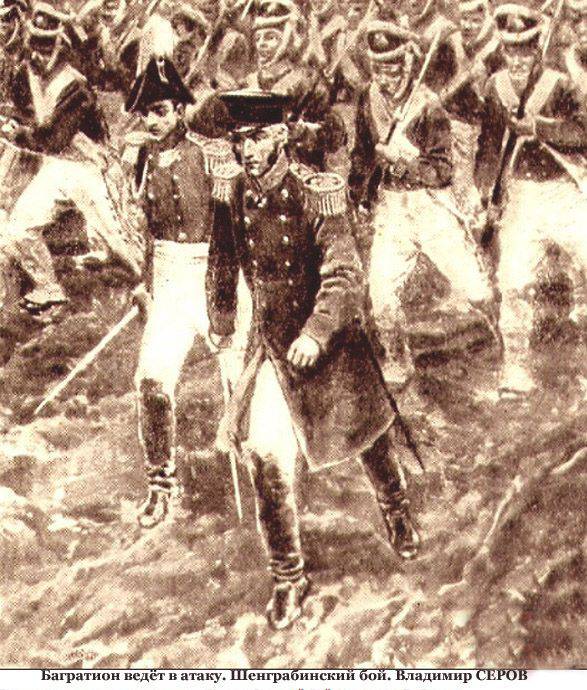
Fighting off the enemy, our troops approached the village of Guntersdorf, where Bagration sent two battalions of infantry and Cossacks in advance. These troops became a new rearguard, restraining the onslaught of the French when the rest of the units passed through the village. The French attacked fiercely, but were repelled. When our troops passed through Guntersdorf, evening came. The battle continued in the dark. However, management was partially disrupted. Each battalion and squadron commander now acted on his own. The French and the Russians continued to fight. The French tried to circumvent and surround. Russian several times made their way with bayonets and butts. Some units were cut off, but the commanders saved them with cunning. Our noble officers knew French as their native language, and when the French closed the way to the retreating columns, they shouted: “What are you doing? Are you disturbing yours !? ”The French were embarrassed and ours continued to move.
The battle lasted until midnight, when Napoleon, arriving at Murat, and seeing that Kutuzov’s army was missing, ordered to cease fire. Bagration continued the retreat and two days later, 6 (18) November joined the Russian army. At the same time the Russians brought the 53 prisoner and took the trophy - the banner. Russian losses amounted to more than 2 thousand people killed and wounded, 12 guns. Kutuzov met Bagration with the words: “I don’t ask about loss; you are alive - that's enough! ”Kutuzov continued his movement, while Bagration remained in the rear guard.
On the march, Kutuzov received instructions from the Austrian emperor to stop and give battle to Napoleon. However, Kutuzov refused such an “honor”, saying that the troops were tired of the crossings, they barely walk and go without food for days. The Russian commander noted that first it was necessary to unite with Buxgevden and various Austrian detachments, after which he would give the army time to rest, and only after that the allied army would be able to launch a counterattack.
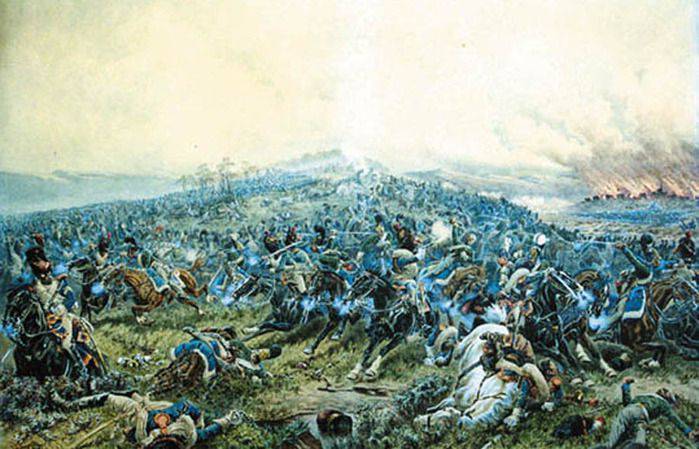
Battle of Schöngraben, 1805 year. K. Buynitsky
Battery Tushina at Schoengraben. N. Karazin
Results
The Russian army left, and Bagration's detachment, which covered its withdrawal, conducted a brilliant battle under Schöngraben with many times superior enemy forces and, having completed its task, joined the main forces at Pohorlitsy. After the battle, Bagration's detachment was called the “heroic squad”. The name of Bagration, a folk hero after the Italian campaign of Suvorov, was famous in Russia and Europe.
Emperor Franz granted Bagration the commander’s degree of the Order of Maria Theresa. Emperor Alexander noted the Pavlograd hussar and Chernigov dragoon regiments of St. George; Kiev Grenadier Regiment, Cossack Sysoev 3-th and Khanzhenkov 1-th regiment of St. George; 6 th Jäger - silver pipes. Kutuzov’s chief assistants, Bagration and Miloradovich, were granted the position of lieutenant general. Austrian Emperor Franz granted Kutuzov 10 thousands of silver guilders.
Actions Bagration allowed Russian to break away from the enemy in two transitions. 6 (18) November Kutuzov's army entered Brunn. Kutuzov continued moving, leaving Brunn. In the area of Olmütz, Kutuzov’s troops merged with the corps of Buxgevden, and then replenished with the arrival of the guard and the 15-thousandth Austrian detachment.
Napoleon, having received the news that Kutuzov had joined up with Buxgevden, 8 (20) stopped in Brunn on November. A new period of war has begun. Napoleon began to concentrate the army and gave her rest. Strong French garrisons were located in Presburg, Vienna and Krems. The French emperor began to prepare a plan for the third stage of the Austrian campaign.
Thus, the skillfully planned and brilliantly organized 400-kilometer-long Kutuzov maneuver allowed him to keep his troops and created favorable conditions for the action of the allies. Kutuzov escaped the enemy's traps several times, guessing and warning the plans of Napoleon and his generals, defeated the French near Krems. The army was saved, which made it possible to continue the war. At the same time, Kutuzov, as a skillful diplomat, avoided the advice of the Vienna Court, the Austrian emperor and the generals, who led to the death of the Russian army, while maintaining good relations with the Austrians.
The Russian army, continuing the work of Suvorov, from Branau to Brunn skillfully repelled the attacks of the enemy. Russian soldiers, officers and generals sought to support the honor of the Russian army, its primacy in military affairs, which existed for a century. The army of Kutuzov from Branau to Brunn lost about 6 thousand people.
Now Kutuzov had 86 thousand soldiers. In addition, the approach of the Russian corps of General Essen was expected in early December, and by mid-December the 40-thousandth Russian army of Bennigsen and the 150-thousandth Austrian army of Archduke Charles and John from Italy and Tyrol could be pulled up. This made it possible to gain superiority in forces and go on to the offensive. The Allied forces were located in a strong position near the city of Olshany, the strategic situation was beginning to change in a direction that was favorable for them. Prussia was close to the decision to join the anti-French coalition. Therefore, the emperor Alexander I, who arrived at the army headquarters, as well as the Austrian emperor Franz, did not consider the matter lost. On the contrary, the victories won by the allies, especially the successes of the Russians at Krems and Schöngrabene, raised the mood at the headquarters of the allied forces. The news of the victory of the British fleet at Trafalgar came. The battle was regarded as the largest military campaign event. Nelson's victory overshadowed Mac's defeat, Trafalgar eclipsed Ulm. According to the European newspapers of those days, after Trafalgar, military happiness passed to the allies. Russian and Austrian emperors were eager to enter into battle with Napoleon.
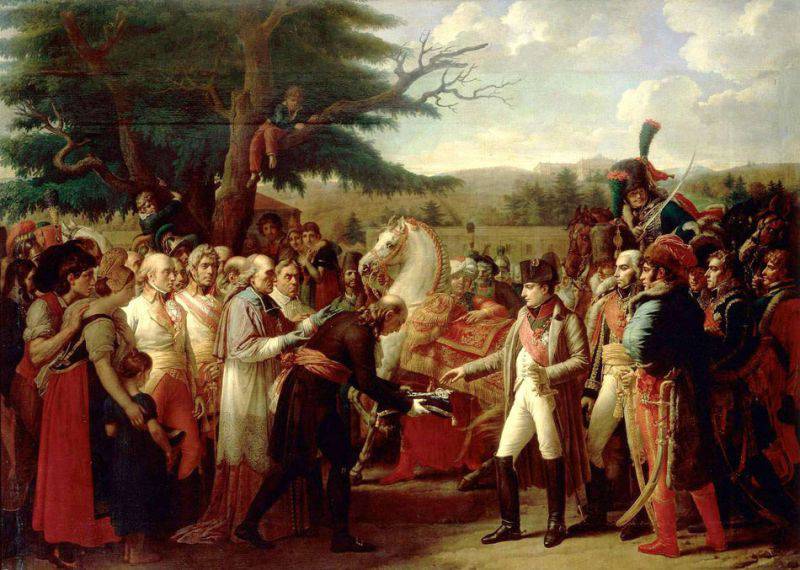
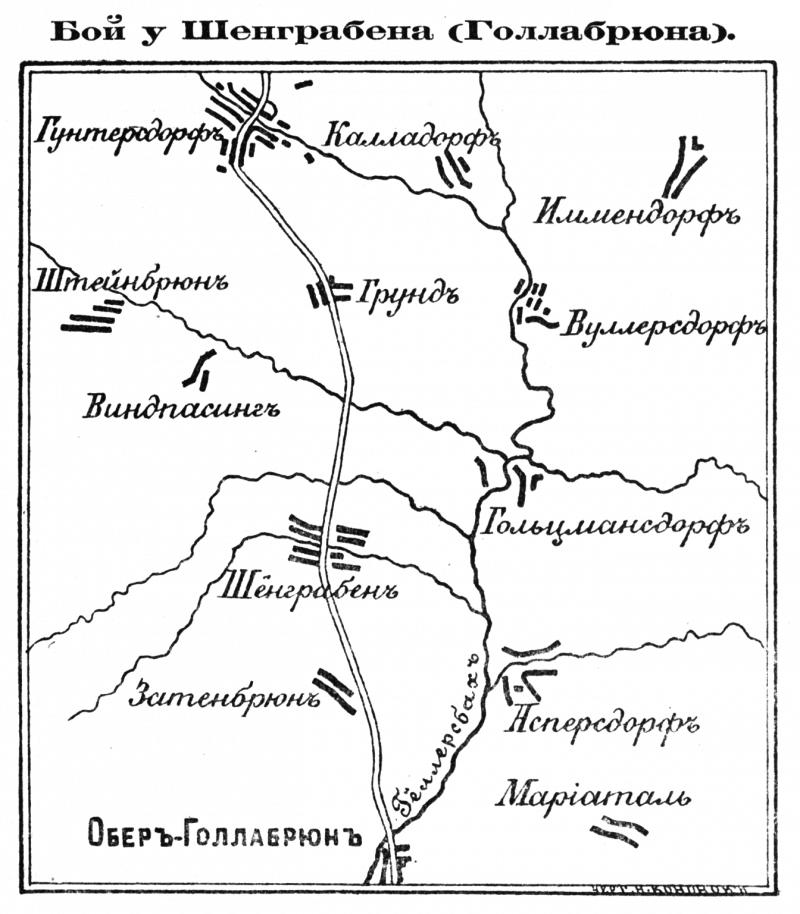
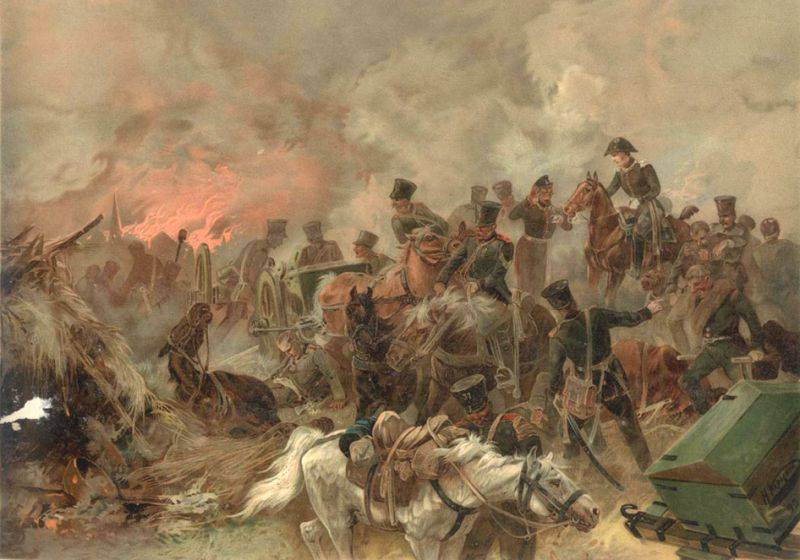
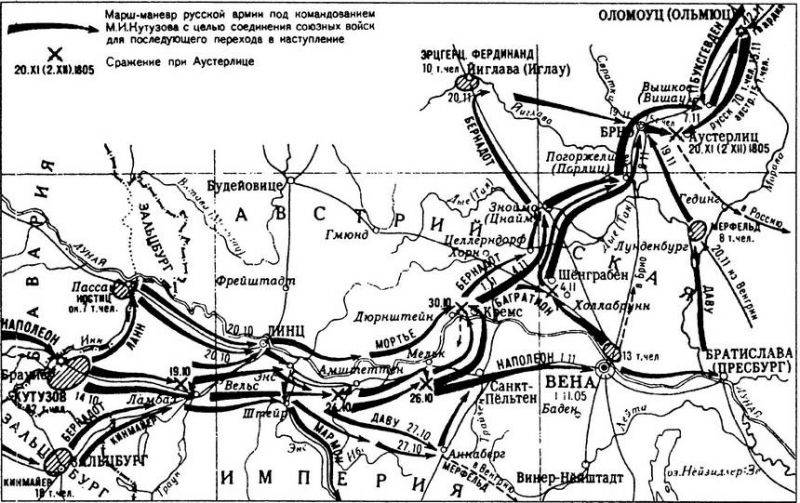
Information